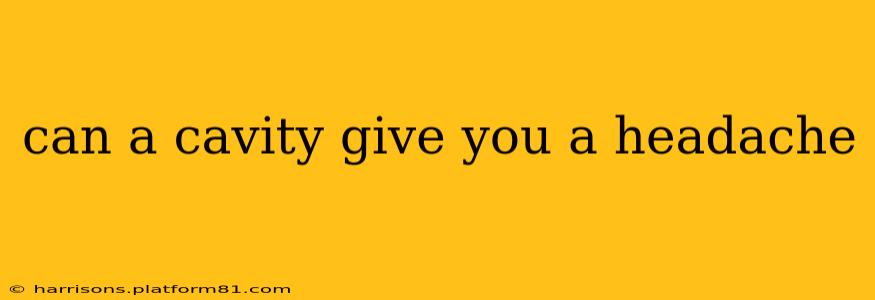A throbbing toothache is miserable enough, but could it actually be causing your headache? The short answer is: yes, a cavity can sometimes lead to a headache. While not all toothaches cause headaches, the connection is plausible and warrants understanding. This article delves into the relationship between cavities and headaches, exploring the underlying mechanisms and offering insights into when to seek professional help.
How Can a Cavity Cause a Headache?
The pain from a cavity doesn't directly trigger a headache in the same way a migraine does. Instead, the intense pain from an untreated cavity often radiates, causing referred pain. This means the pain originates in your tooth but is felt in other areas, frequently manifesting as a headache. Several factors contribute to this:
Nerve Inflammation and Irritation:
A cavity involves tooth decay, which irritates and inflames the pulp—the soft tissue containing nerves and blood vessels within your tooth. This inflammation can trigger intense pain signals that travel through the trigeminal nerve, a major cranial nerve responsible for sensation in your face and head. The trigeminal nerve's extensive network can transmit this pain signal, leading to headaches, often felt in the temples or forehead, on the same side as the affected tooth.
Sinus Pressure and Infection:
Severe cavities can lead to infection, particularly if the infection spreads beyond the tooth's pulp. This infection can impact the sinuses, which are located close to the upper teeth. The resultant inflammation and pressure within the sinuses can contribute to sinus headaches, further compounding the pain.
Muscle Tension:
The intense pain from a toothache often leads to clenching or grinding of your teeth (bruxism), which further strains the jaw muscles. This prolonged muscle tension can result in tension headaches, adding another layer of discomfort to the experience.
What Type of Headache Can a Cavity Cause?
The type of headache associated with a cavity can vary, depending on the severity of the decay and the individual's response to pain:
- Tension Headaches: These are the most common type of headache linked to toothaches, characterized by mild to moderate pain and tightness in the head and neck.
- Sinus Headaches: If the infection spreads to the sinuses, sinus headaches may occur, presenting as pain and pressure in the face and forehead.
- Migraines: While less common, severe toothaches can, in some cases, trigger migraines in susceptible individuals. The intense pain and inflammation may be sufficient to initiate a migraine episode.
Can a Filling Cause a Headache?
While a filling itself shouldn't cause a headache, the process of getting a filling or the presence of an improperly placed filling can contribute to pain. This pain can be felt immediately after the procedure or may develop over time. Possible reasons include:
- Irritation from the filling material: In rare cases, the filling material might irritate the nerve, causing pain.
- Poorly placed filling: An improperly placed filling may put pressure on the surrounding teeth, leading to discomfort and possible headaches.
When Should I See a Dentist About Tooth Pain and Headaches?
Don't delay seeking professional help if you experience tooth pain accompanied by headaches. A dentist can accurately diagnose the cause of your pain and provide appropriate treatment. Prompt treatment of cavities prevents further complications, such as infections and more severe pain.
How is Toothache-Related Headache Treated?
Treatment for a headache related to a cavity focuses on addressing the underlying dental issue. This often involves:
- Root Canal: For severe cavities affecting the pulp, a root canal may be necessary to remove the infected pulp and prevent further damage.
- Filling: A simple filling is often sufficient for less severe cavities.
- Extraction: In extreme cases, the tooth may need to be extracted.
- Pain Relief: Over-the-counter pain relievers such as ibuprofen or acetaminophen can provide temporary relief from toothache and headache pain, but they don't address the underlying cause.
By addressing the dental problem promptly, the associated headache symptoms typically resolve. Remember to always consult a dentist for accurate diagnosis and appropriate treatment. Ignoring the issue could lead to worsening infection and more intense pain.
